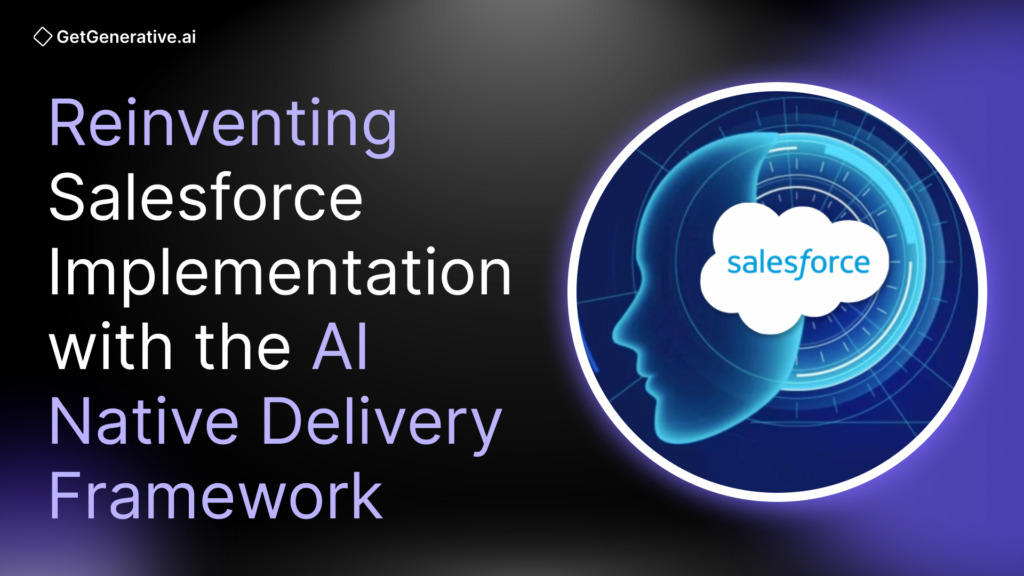Reinventing Salesforce Implementation with the AI Native Delivery Framework
An AI-native (or AI-first) Salesforce implementation is more than an upgrade; it’s a complete reengineering of how CRM projects are executed. It replaces labor-intensive processes with intelligent automation, dramatically accelerating timelines while increasing consistency, adaptability, and return on investment (ROI).
This transformation is driven by what we call the AI Native Delivery Framework—a structured yet adaptive methodology that integrates intelligent agents across every stage of implementation.
In this blog, we explore how forward-thinking firms like GetGenerative.ai are leading the way, transforming Salesforce delivery from a service into a productized, intelligent experience.
AI Is Reshaping Business Models Across Industries
Across verticals, AI is transforming how businesses operate:
- 78% of global organizations now use AI in at least one business function, up from 55% in 2023, according to a 2024 McKinsey survey.
- 83% of AI-enabled sales teams reported revenue growth, compared to just 66% among their non-AI counterparts.
- AI enables capabilities like usage-based insurance, real-time preventive maintenance, and on-demand product customization, shifting businesses from fixed models to dynamic, adaptive ones.
This isn’t just about doing the same work faster. AI is enabling entirely new value propositions. It’s powering smart factories, predictive healthcare, and hyper-personalized retail—all through systems that learn and evolve. In this new paradigm, AI isn’t just part of the tech stack—it’s central to the business model.
Why Salesforce Consulting Is Facing Disruption
Salesforce consulting, long dominated by human-heavy methods, is ripe for AI-driven disruption.
Traditionally, implementations have required:
- Weeks of discovery workshops
- Manual configuration of fields, workflows, and automations
- Custom Apex coding and multi-round testing cycles
But that model is rapidly becoming outdated. Forrester Research (2024) predicts that AI-powered CRM implementations will reduce delivery costs by 40–60%. The implication is clear: consulting firms that rely on billable hours for manual work are facing an existential threat.
Case in point: Wiley, a global education firm, used Salesforce-integrated AI agents to improve case resolution efficiency by 40%, offloading repetitive queries and enabling real-time intelligent decisions. This wasn’t just process improvement—it was a reimagining of customer support.
Meanwhile, Salesforce itself is accelerating the shift with tools like Einstein GPT and Agentforce, which allow AI agents to handle lead routing, query resolution, and data updates autonomously. With AI now automating core functions, the most sought-after consulting firms aren’t the ones with the largest headcount—they’re the ones delivering AI-driven outcomes, faster.
From AI Bolt-On to AI-First: A True Paradigm Shift
Many legacy-era firms treat AI as an enhancement, bolting it onto their existing processes. But true transformation demands a ground-up redesign. This is where AI-native firms like GetGenerative.ai stand apart.
In an AI-bolt-on approach:
- Teams still follow manual discovery, design, and build phases.
- AI might be used for lead scoring or report generation post-deployment.
In an AI-native model:
- AI powers the entire lifecycle—from parsing RFPs to generating user stories, solution designs, metadata, code, and tests.
- Consultants act as orchestrators and validators, not manual executors.
This model flips the traditional delivery equation:
Instead of selling hours, you’re delivering intelligence, speed, and adaptability.
Just as cloud-native software wasn’t just on-prem software hosted in the cloud, AI-native Salesforce implementations aren’t just traditional projects with a chatbot added—they’re intelligent systems that evolve by default.
Reinventing Methods, Architecture, and Delivery Models
An AI-native approach isn’t just about tools—it reshapes the very architecture of implementation.
Methodology Transformation
Old Model:
- Waterfall or Agile, executed by humans using static tools
- Clear phases: discovery → design → build → test → deploy
AI-Native Model:
- Iterative, AI-powered delivery
- AI generates drafts of designs, user stories, and prototypes instantly
- Humans validate, fine-tune, and set strategy
- Speed and iteration become key metrics
Architecture Transformation
Old Model:
- Rule-based logic hardcoded in Apex or Flows
- Rigid, static automations
AI-Native Model:
- Adaptive architecture: AI engines observe behavior and adjust logic in real-time
- Generative Lightning UIs that evolve with user interaction
- Data-centric systems that fuel continuous learning
Salesforce’s investments in Generative Lightning Canvas and AI-driven metadata configuration indicate a future where your CRM updates itself based on usage patterns and business needs.
Delivery Model Transformation
Old Model:
- Large human teams
- Time-based or milestone billing
AI-Native Model:
- Leaner teams with specialized AI and strategic roles
- Deliverables generated in hours, not weeks
- New commercial models (e.g., outcome-based pricing, AI usage subscriptions)
The result? Project timelines shrink from 10 months to 1, and success is measured in speed, impact, and adaptability, not headcount.
Also Read – Salesforce Proposal Creation With AI
What an AI-Native Salesforce Implementation Actually Looks Like
Let’s break down a real AI-native implementation process using intelligent agents:
1. Intelligent Automation From Day Zero
AI agents analyze RFPs, interview transcripts, and project inputs to:
- Recommend Salesforce Clouds and products
- Auto-generate a tailored solution blueprint
- Create draft proposals, demo orgs, and initial project timelines
2. Predictive & Generative Configuration
- AI Design Agents translate business requirements into structured metadata, data models, roles, and user stories
- AI Build Agents generate Apex code, Flows, and configuration assets
- Example: For a support automation story, the AI can write an Apex trigger to auto-close inactive cases with built-in best practices
3. Continuous Learning and Optimization
- AI monitors system usage and process performance
- Suggests improvements (e.g., shorter sales cycles, automated escalations)
- Support bots evolve to handle more queries based on real-world interactions
4. Human-in-the-Loop Governance
Consultants oversee outputs, apply judgment, and enforce compliance. AI augments, rather than replaces, human expertise, yielding smarter outcomes and maintaining control.
New Roles and Skills for AI-Era Implementation Teams
As AI transforms Salesforce implementation, the roles within delivery teams are evolving. While AI automates routine tasks, human expertise becomes more strategic, analytical, and cross-functional. The most successful teams blend business knowledge, AI literacy, and adaptability.
Prompt Engineers
A newly essential role, prompt engineers specialize in crafting precise inputs that guide generative AI agents. In Salesforce implementations, they:
- Translate business needs into clear AI prompts
- Optimize AI output (e.g., user stories, code snippets, solution diagrams)
- Collaborate with consultants to align AI-driven configurations to business goals
Prompt engineering is now considered a high-leverage skill, essential for unleashing the full value of AI in enterprise use cases.
AI Strategists / Business AI Advisors
These professionals serve as strategic bridges between AI capabilities and business outcomes. Their responsibilities include:
- Identifying where AI can automate or enhance Salesforce processes
- Defining AI use cases in service, sales, marketing, and ops
- Ensuring ethical and compliant AI usage (e.g., explainability, fairness)
An AI strategist is today’s evolved business analyst—part visionary, part technologist.
AI Platform Trainers
These specialists train AI agents on organizational context and data. For Salesforce:
- They fine-tune AI support bots using real tickets and resolution patterns
- Curate datasets to teach AI agents how to respond to unique edge cases
- Continuously monitor AI performance and optimize learning loops
AI training is akin to onboarding a junior employee—only the employee learns faster and scales infinitely.
AI-Enhanced Developers and Admins
Traditional roles aren’t obsolete—they’re evolving. Developers and admins now:
- Collaborate with AI to validate or extend generated code/configurations
- Learn how to prompt AI effectively for metadata design or test case generation
- Focus more on strategic customization and business logic
Salesforce’s own leadership echoes this shift. As Jayesh Govindarajan, Head of AI Engineering at Salesforce, said:
“Understanding the business problem is more important than knowing how to write code.”
AI Governance and Ethics Officers
With AI comes responsibility. These roles ensure AI use aligns with:
- Data privacy laws (e.g., GDPR, HIPAA)
- Fair decision-making (e.g., no algorithmic bias in approvals or routing)
- Ethical escalation protocols (e.g., when AI is uncertain or error-prone)
Such roles are now critical in regulated industries and large enterprises.
Leveraging GetGenerative.ai’s AI Platform for Implementation
To fully realize the AI-native approach, firms need more than just strategy—they need purpose-built AI tools. That’s where GetGenerative.ai stands out.
A Platform of Specialized AI Agents
GetGenerative.ai offers an integrated platform of intelligent agents, each aligned to a specific Salesforce project phase:
- Pre-Sales Agent: Analyzes client inputs, generates solution blueprints, drafts proposals
- Design Agent: Converts business requirements into detailed user stories and technical specifications
- Build Agent: Translates designs into Salesforce metadata, Apex code, and automation
- Test Agent: Creates test cases, automates test runs, and syncs with JIRA
- Deploy Agent: Manages go-live readiness and configuration deployment
- Support Agent: Resolves tickets by reusing project context and proposing fixes
These agents pass knowledge seamlessly between phases, eliminating silos and data loss—a common issue in human-led delivery.
Real-World Impact
Clients using GetGenerative.ai report:
- Up to 10x faster project delivery
- Significant cost savings from reduced manual effort
- Fewer defects and rework thanks to design-build-test continuity
- Improved client satisfaction via demos and prototypes generated in days, not weeks
For example, rather than manually writing 300 user stories and matching them to metadata, the AI Design Agent can generate them automatically, while the Build Agent configures the system, saving months of effort.
Enterprise-Grade and Salesforce-Specific
GetGenerative.ai is not a general-purpose AI. Its platform is:
- Pre-trained on Salesforce metadata, objects, and best practices
- Integrated with Salesforce APIs and tools (e.g., Metadata API, DevOps Center, Einstein)
- Compliant with enterprise data policies and includes customizable AI model plug-ins
It also offers a customization studio, allowing organizations to adapt agents to their unique processes and terminology, ensuring alignment without losing speed.
End Note
AI-native Salesforce implementation is no longer a futuristic idea—it’s today’s competitive advantage. Organizations that embrace this approach will see:
- Dramatically shorter project timelines
- Adaptive, continuously optimizing CRMs
- Greater ROI and user adoption
- A strategic edge in rapidly evolving markets
GetGenerative.ai, with the GetGen Labs initiative, is pioneering this transformation. By combining expert oversight with intelligent automation, they’re redefining how Salesforce implementation is executed—from weeks of manual effort to intelligent delivery in days.
The future of Salesforce consulting is here. It’s fast. It’s intelligent. It’s AI-native.
Book a demo today to see how it works!




